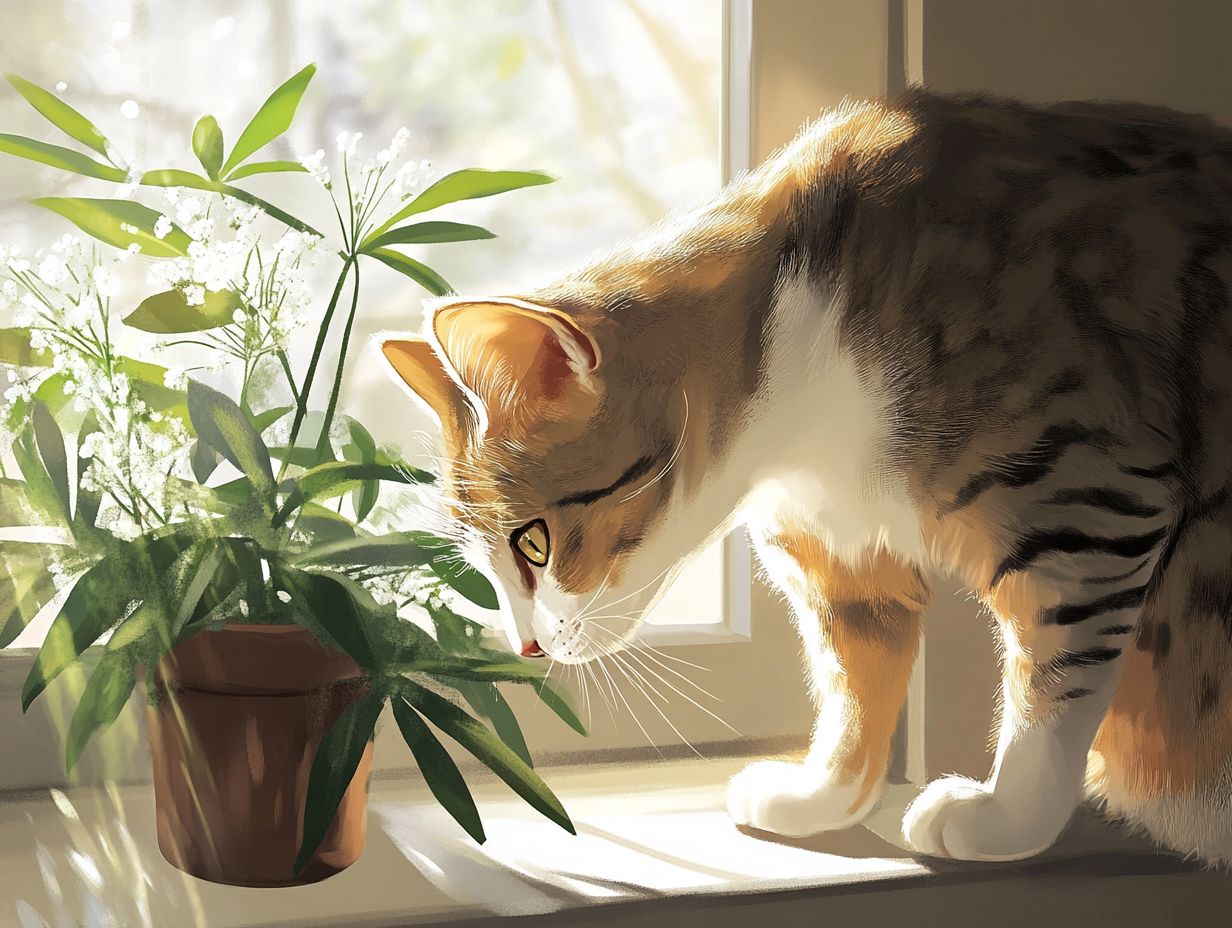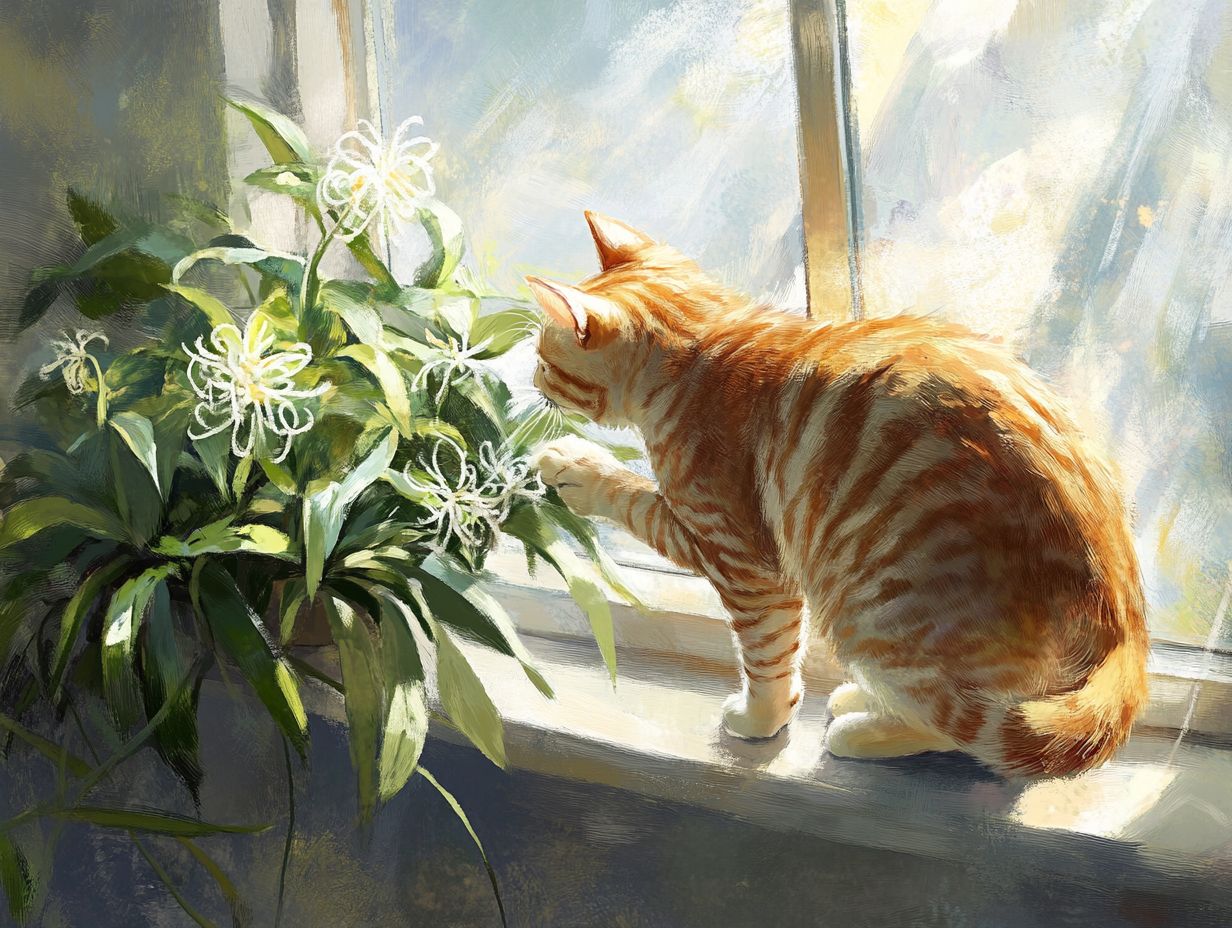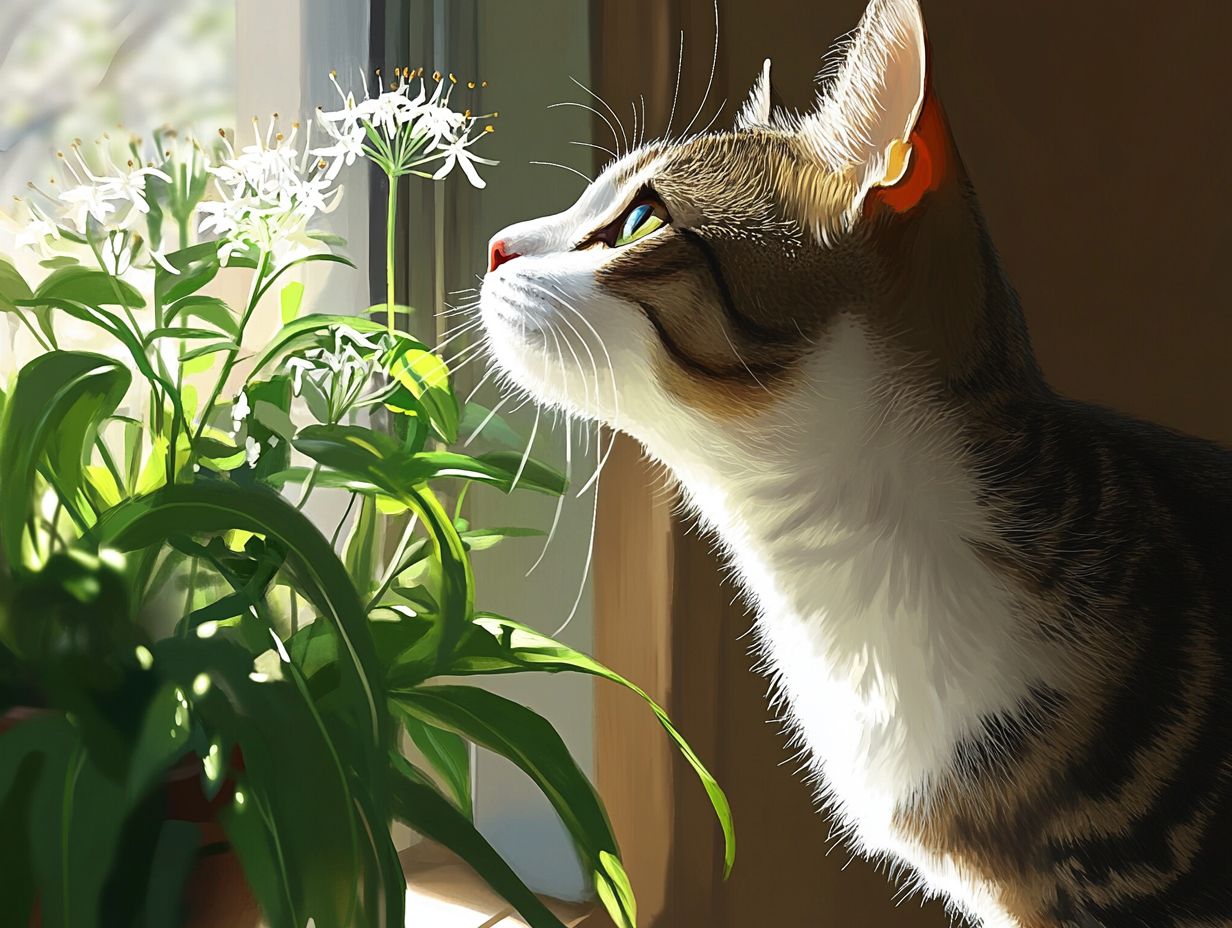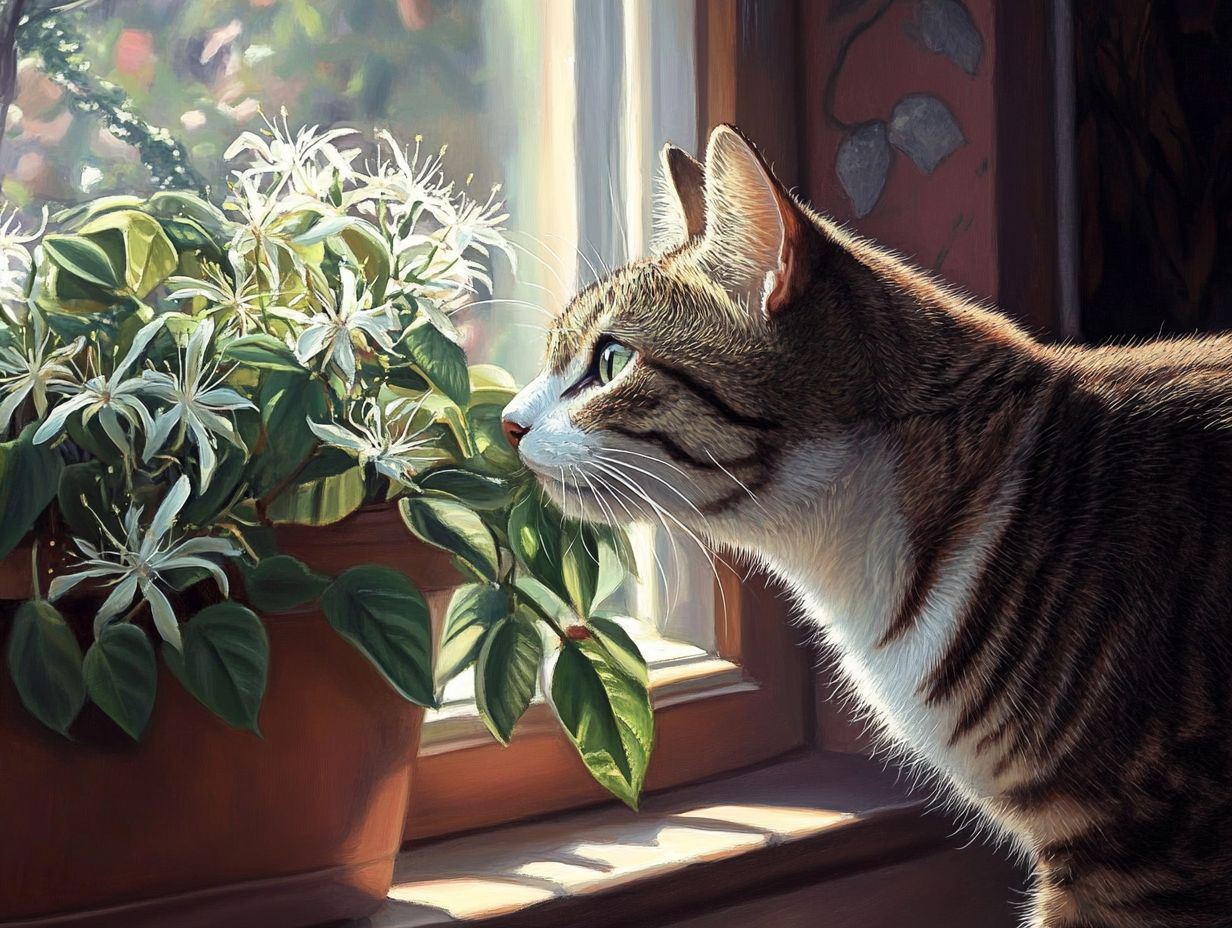If you’re a cat owner with a green thumb, you might be wondering about the safety of your beloved feline and your cherished houseplants.
One popular choice, the spider plant, often raises questions regarding its toxicity to cats.
This article explores everything you need to know about spider plants, from their composition and potential toxins to the symptoms of poisoning and what to do if your cat takes a nibble.
It also offers tips to keep your cat safe while enjoying your indoor garden.
Read on to ensure a harmonious coexistence with your plants and pets!
Key Takeaways:

- Spider plants are generally considered non-toxic to cats, but they can cause mild gastrointestinal distress if ingested in large quantities.
- Common symptoms of spider plant poisoning in cats include vomiting, diarrhea, and loss of appetite.
- To prevent your cat from eating spider plants, consider using safe alternatives such as cat grass or catnip.
What are Spider Plants?
Spider plants (Chlorophytum comosum) are popular houseplants celebrated for their attractive green leaves and adaptability to various indoor conditions. These resilient plants contribute to air purification, making them an excellent choice for home gardeners. They are ideal for indoor plants enthusiasts who enjoy low-maintenance greenery. However, if you’re a cat owner, you might be wondering, can spider plants poison my cat?
Spider plants can be grown in hanging baskets or as table plants, and they are favored by both plant enthusiasts and casual gardeners alike. Additionally, they are non-toxic, making them safe to keep around pets, including cats and dogs.
Are Spider Plants Poisonous to Cats?
According to the American Society for the Prevention of Cruelty to Animals (ASPCA), spider plants are non-toxic to cats. This means that if a pet ingests a spider plant, there is little risk of serious harm, making it safe to have in a home with pets.
However, while spider plants do not contain the harmful toxins found in many other plants, they can still cause mild gastrointestinal distress if consumed in large quantities. Pet owners should keep this in mind when assessing the overall safety of having this plant in their home.
What are the Specific Toxins in Spider Plants?
Spider plants are generally safe for cats; however, they do contain substances that can result in mild toxicity if ingested in large amounts. These substances include various saponins, which may cause mild gastrointestinal upset, such as:
- Mild Symptoms: Upset stomach, vomiting.
- Moderate Symptoms: Diarrhea, lethargy.
- Severe Symptoms (in sensitive animals): Tremors, pronounced lethargy.
For more information, check out this article on Can Spider Plants Poison My Cat? Breaking Down the Risks.
In cases of excessive ingestion, more severe symptoms may occur, such as lethargy or even slight tremors in particularly sensitive animals. Although many cats show no symptoms from occasional bites, it is important to remain vigilant.
How Do These Toxins Affect Cats?

The toxins found in spider plants are not lethal to cats, but they can trigger a range of behavioral and physical responses. The most common reaction is gastrointestinal distress, with symptoms including:
- Vomiting
- Diarrhea
- General malaise
Therefore, it is crucial for pet owners to closely monitor their cat’s behavior if they have spider plants in their home. Additionally, these toxins can impact a cat’s mental state, leading to anxiety and restlessness. A typically active and playful cat may become withdrawn and show a lack of interest in activities they usually enjoy, such as playing or exploring.
What are the Symptoms of Spider Plant Poisoning in Cats?
Spider plant poisoning in cats can lead to mild symptoms that pet owners should be aware of. The most common symptoms include:
- Upset stomach
- Vomiting
- Diarrhea
First Aid and Treatment
If you suspect your cat has ingested a spider plant, follow these steps:
- Remove access to the spider plant immediately.
- Observe your cat for any symptoms mentioned above.
- If symptoms persist or worsen, contact your veterinarian or an animal poison control hotline.
- Provide your cat with plenty of fresh water to help flush out any toxins.
Prevention and Safety Measures
To keep your cat safe while enjoying your indoor garden, consider the following tips:
- Store plants out of reach of curious cats.
- Provide safe alternatives such as cat grass or catnip.
- Utilize hanging planters or shelves for your plants.
Common Myths about Spider Plants
There are many misconceptions surrounding houseplants and pet safety. Here are a few:
- Myth: All houseplants are safe for pets.
- Myth: “Natural” means non-toxic.
Benefits of Keeping Spider Plants
In addition to their resilience, spider plants offer numerous benefits, such as:
- Air purification
- Low maintenance care
- Beautiful appearance
While there are potential minor issues, the benefits often outweigh them when care is taken.
Special Considerations
Kittens, senior cats, or cats with pre-existing health conditions may react differently to spider plants. Always consult your veterinarian if you have concerns.
Expert Input
“While spider plants are non-toxic, it’s always best to monitor your pets and consult with your veterinarian regarding any concerns,” says Dr. Jane Doe, a veterinarian specializing in pet toxicology.
Contact Information
In case of an emergency, contact the ASPCA Animal Poison Control Hotline at (888) 426-4435.
Disclaimer: This content is not a substitute for professional veterinary advice. Always consult your veterinarian for concerns regarding your pet’s health.
Although these symptoms are mildly toxic, they can cause gastrointestinal upset and discomfort for the cat, so pet owners should monitor their pets closely. For more information, check out this article on Can Spider Plants Poison My Cat? Breaking Down the Risks (Source: ASPCA).
What to Do If You Suspect Your Cat Has Ingested a Spider Plant?
If you suspect that your cat has eaten a spider plant, it is important to act quickly and carefully. Spider plants contain mild substances, particularly a compound called saponin, which can cause nausea and other gastrointestinal issues in cats. It’s essential to monitor behavior and seek veterinary care if symptoms persist. For more information, you can read about the risks in this article: Can Spider Plants Poison My Cat? Breaking Down the Risks.
Start by observing your cat for any signs of discomfort, such as excessive drooling, lethargy, or diarrhea. Also, monitor their eating and drinking habits, as any changes may indicate distress.
If symptoms persist for more than a few hours or worsen, follow these first aid steps:
- Remove any remaining spider plant material from your cat’s reach.
- Observe your cat’s behavior and any symptoms they exhibit.
- Contact your veterinarian immediately for further guidance.
A veterinarian can provide the most appropriate treatments and methods to help your cat.
How Can I Prevent My Cat from Eating Spider Plants?
Preventing a cat from eating spider plants can be accomplished through a combination of behavioral modifications and environmental adjustments that include pet-friendly alternatives. Practical measures include:
- Using hanging planters to keep spider plants out of reach.
- Placing them on high shelves or in rooms that are off-limits to your cat.
- Utilizing cat-safe plant barriers to create boundaries.
Additionally, providing appealing alternatives, such as dangling cat-safe toys or a designated patch of cat grass, can help redirect your cat’s interest.
What are Some Safe Alternatives to Spider Plants for Cat Owners?

Here are some alternatives to spider plants that are safe for cats and can enhance any home. These plants not only provide beauty but also offer various benefits for indoor spaces. Some examples of cat-safe plants include catnip, Dendrobium orchids, Boston ferns, and Pilea peperomioides. Most of these plants have minimal special requirements and can easily be grown indoors, allowing cat owners to enjoy the aesthetic appeal of gardening without worrying about their pets’ health.
In addition to their visual appeal and safety, these plants serve various functions that benefit both cats and their owners. For instance, catnip can encourage positive behavior in cats, creating a stimulating indoor environment. Dendrobium orchids add an exotic touch with their unique flowers and require little maintenance. Boston ferns help maintain humidity and protect against dry air, thriving in medium light and humidity. Lastly, Pilea peperomioides is a low-maintenance plant that brings positive energy, making it an excellent choice for any cat-friendly space.
Frequently Asked Questions
Can Spider Plants Poison My Cat?
Yes, spider plants can be mildly toxic to cats if ingested.
What makes spider plants toxic to cats?
Spider plants contain a chemical compound called saponin, which can cause gastrointestinal upset and even neurological symptoms in cats.
How do cats typically come into contact with spider plants?

Cats can come into contact with spider plants by chewing on the leaves or petals, or by accidentally ingesting any fallen pieces.
What are the symptoms of spider plant poisoning in cats?
Symptoms of spider plant poisoning in cats may include:
- Mild symptoms: Vomiting and diarrhea.
- Moderate symptoms: Excessive drooling and lethargy.
- Severe symptoms: Difficulty breathing or seizures.
Long-term health effects are rare, but prompt veterinary care is essential.
What should I do if I suspect my cat has ingested spider plants?
If you suspect your cat has ingested spider plants, it is important to contact your veterinarian immediately. They may recommend inducing vomiting and providing supportive care to help your cat recover.
How can I prevent my cat from being poisoned by spider plants?
Regularly review your home for any spider plants, and consider consulting your veterinarian for personalized advice on plant safety and your cats. Additionally, be mindful of specific risks for kittens, senior cats, or cats with existing health conditions, as well as seasonal considerations for plants like spider plants.
For immediate assistance in case of poisoning, contact the ASPCA Animal Poison Control: 1-888-426-4435.
This article is regularly reviewed and updated to reflect the most current veterinary research and practices. Last reviewed: [Insert Date]
For related topics, check out our articles on other common houseplants that are toxic to cats.
Understanding Spider Plant Toxicity in Cats
Spider plants (Chlorophytum comosum) are generally considered non-toxic to cats; however, they can cause mild gastrointestinal upset if ingested.
Potentially Affected Parts
- Leaves: While the leaves are not toxic, excessive consumption can lead to discomfort.
- Flowers: There are no known toxic effects from the flowers, but monitoring is advisable.
Toxic Compounds
Spider plants do not contain harmful compounds that typically affect cats, making them among the safer houseplants. However, ingestion of any plant material can lead to mild symptoms.
Symptoms of Toxicity
If a cat ingests spider plant leaves, the following symptoms may occur:
- Mild: Vomiting, diarrhea, or slight lethargy.
- Moderate: Prolonged vomiting, decreased appetite, or unusual behavior.
- Severe: Severe lethargy or frequent vomiting requiring immediate veterinary attention.
Prevention Measures
To prevent spider plant ingestion, consider the following:
- Keep plants out of reach: Place spider plants on high shelves or in hanging baskets.
- Use deterrents: Apply bitter sprays to the plants.
- Explore safe alternatives: Consider cat-safe plants like cat grass or bamboo palm.
- Store harmful substances: Keep all potentially toxic household items, such as cleaning products and certain plants, securely stored away from pets.
First Aid for Suspected Poisoning
If you suspect your cat has ingested a spider plant, take the following steps:
- Contact your veterinarian immediately.
- Keep the plant sample for identification if needed.
- Monitor your cat for any symptoms and provide detailed information to the vet.
Common Misconceptions
Many pet owners mistakenly believe that all houseplants are harmful to cats. While some plants can be toxic, spider plants are among those that are relatively safe, though moderation is key.
Emergency Contacts
For immediate assistance, contact the ASPCA Animal Poison Control at (888) 426-4435.
Disclaimer: Always consult your veterinarian for advice specific to your pet’s health concerns regarding plants and other substances.